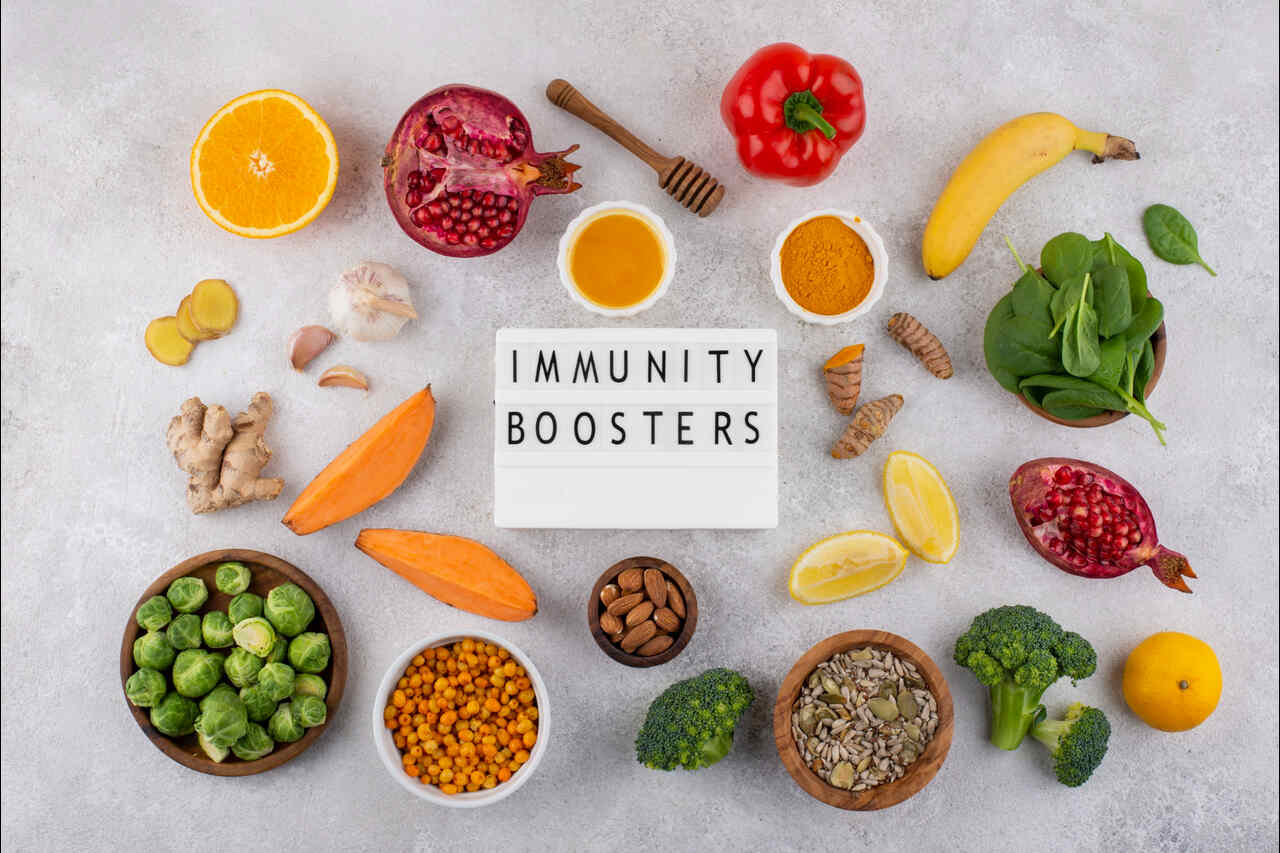Table of Contents
In the quest for optimal health, the significance of a robust immune system cannot be overstated. As we navigate a world of challenges, it becomes imperative to explore proactive measures to fortify our body’s defenses. This journey begins with a focus on nutrient-rich foods to support immune system function.
In this enlightening exploration, we will delve into nutrition’s pivotal role in bolstering our immunity. From essential vitamins like C and D to crucial minerals such as zinc and selenium, we’ll uncover the key components vital for immune health. Moreover,
we’ll embark on a culinary excursion, unveiling a diverse array of delectable recipes and practical tips to incorporate these immune-boosting ingredients into your daily meals seamlessly. Join us on this transformative path as we unravel the secrets of building resilience through the power of nutrient-rich foods.
Understanding Immune System Function:
The immune system, a complex network of cells and proteins, safeguards the body against pathogens; a closer look at white blood cells, antibodies, and the dynamic interplay of innate and adaptive responses reveals its intricate defense mechanisms.
1. The Immune System Overview:
The immune system is our body’s frontline defense against pathogens, working tirelessly to keep us healthy. Comprising an intricate network of cells, tissues, and organs, it functions cohesively to detect and neutralize potential threats.
2. White Blood Cells: The Guardians of Immunity:
White blood cells are at the heart of immune function, the vigilant guardians patrolling our bloodstream. Leukocytes, including neutrophils, lymphocytes, and monocytes, play distinct roles. Neutrophils swiftly respond to infections, lymphocytes orchestrate targeted responses, and monocytes engulf and eliminate invaders once transformed into macrophages.
3. Antibodies: Precision Weapons Against Invaders:
Antibodies, specialized proteins, are the precision weapons the immune system employs. Produced by B lymphocytes, these molecules recognize and neutralize specific pathogens, preventing them from causing harm. The ability to adapt and ‘remember’ invaders enhances the immune system’s effectiveness over time.
4. The Innate and Adaptive Arms: A Dynamic Duo:
The immune system operates through two primary arms: the innate and adaptive responses. The natural arm provides immediate, nonspecific defense, while the adaptive arm tailors responses for long-term immunity through the creation of memory cells. This dynamic interplay ensures a comprehensive and adaptable defense strategy.
5. Immune System and Overall Well-being:
The immune system is not merely a shield against infections; it profoundly influences overall well-being. A well-functioning immune system contributes to the body’s ability to recover from illnesses, reduces susceptibility to infections, and plays a pivotal role in preventing chronic diseases. This interconnected relationship underscores the importance of nurturing our immune system for sustained health and vitality. Understanding these fundamental aspects sets the stage for exploring the pivotal role of nutrient-rich foods in fortifying this intricate defense mechanism.
Key Nutrients for Immune Support:
Our body’s immune system relies on a strategic alliance with various nutrients to function optimally. Understanding the role of specific vitamins, minerals, and essential compounds is pivotal in fortifying immune responses and maintaining overall health.
1. Vitamin C: The Immune Booster:
Vitamin C, abundant in citrus fruits, strawberries, and bell peppers, acts as a powerful antioxidant. It enhances the production and function of white blood cells, fortifying the immune response. Recommended daily intake levels hover around 90mg for men and 75mg for women.
2. Vitamin D: The Sunshine Vitamin:
Fatty fish like salmon, mackerel, and fortified dairy products provide a rich source of vitamin D. This vitamin is essential for immune cell modulation and promoting antimicrobial functions. Adequate sunlight exposure is also crucial for maintaining optimal vitamin D levels, with a recommended daily intake of 600 IU.
3. Zinc: The Gatekeeper of Immunity:
Nuts, seeds, legumes, and whole grains supply the body with zinc, a mineral vital for immune cell development and function. Zinc supports the activity of white blood cells and helps regulate inflammatory responses. The recommended daily intake is approximately 11mg for men and 8mg for women.
4. Selenium: The Antioxidant Ally:
Brazil nuts, fish, and whole grains are excellent sources of selenium. This mineral acts as a key component in antioxidant enzymes, protecting cells from damage and supporting immune function. The recommended daily intake for selenium is around 55 micrograms.
5. Other Immune-Boosting Compounds:
Beyond vitamins and minerals, certain compounds like garlic, ginger, and turmeric exhibit immune-boosting properties. Garlic, in particular, contains allicin, which has antimicrobial effects. Incorporating these compounds into your diet adds extra support for immune health.
Understanding these critical nutrients’ roles and recommended intake levels lays the foundation for making informed dietary choices that can significantly contribute to a resilient and effective immune system.
Nutrient-rich foods to support immune system function:
Embarking on a culinary journey to fortify your immune system involves embracing diverse nutrient-rich foods. Organized by key immune-supporting nutrients, the following list ensures a vibrant and varied selection, accommodating diverse dietary preferences and restrictions.
Vitamin C:
Citrus Fruits: Oranges, grapefruits, lemons, and limes burst with vitamin C, providing a zesty and refreshing boost to your immune system.
Strawberries: These vibrant berries are not only delicious but also packed with vitamin C, contributing to your daily immune support.
Bell Peppers: Whether red, yellow, or green, bell peppers are rich in vitamin C, adding a colorful and nutritious flair to your meals.
Broccoli: This cruciferous vegetable is a nutritional powerhouse, offering a generous dose of vitamin C along with other essential nutrients.
Vitamin D:
Fatty Fish: Salmon, mackerel, and trout are excellent sources of vitamin D, promoting immune cell modulation and overall well-being.
Fortified Dairy Products: Milk, yogurt, and fortified plant-based milk alternatives contribute to vitamin D intake, supporting immune health.
Sunlight Exposure: While not a food, adequate sunlight exposure remains a natural and essential source of vitamin D synthesis.
Zinc:
Nuts and Seeds: Almonds, sunflower seeds, and pumpkin seeds are nutrient-rich snacks that supply the body with zinc, supporting immune cell development.
Legumes: Beans, lentils, and chickpeas are versatile and plant-based sources of zinc, ideal for vegetarian and vegan diets.
Whole Grains: Oats, quinoa, and brown rice are wholesome grains that not only provide essential fiber but also contribute to your daily zinc intake.
Selenium:
Brazil Nuts: A small serving of Brazil nuts fulfils your selenium requirements, offering a tasty and nutritious snack.
Fish: Tuna, halibut, and sardines are seafood options rich in selenium, supporting antioxidant enzyme function.
Whole Grains: Incorporating whole grains like brown rice and barley into your meals provides a steady source of selenium.
Other Immune-Boosting Compounds:
Garlic: This pungent bulb contains allicin, known for its antimicrobial properties, making it a flavorful addition to various dishes.
Ginger: Renowned for its anti-inflammatory and antioxidant properties, ginger adds a spicy kick to both savory and sweet dishes.
Turmeric: Curcumin, the active compound in turmeric, offers potent anti-inflammatory and immune-modulating effects, making it a valuable spice in cooking.
Diversifying your diet with these nutrient-rich foods ensures a holistic approach to immune system support, catering to various tastes and dietary needs.
The below table delineates nutrient-rich foods essential for immune support, highlighting their respective nutrients and emphasizing their recommended daily intake, fostering a comprehensive understanding of a health-conscious dietary approach.
| Nutrient-Rich Foods | Nutrients | Function | Recommended Daily Intake |
| Citrus Fruits | Vitamin C | Supports immune cell production, | Approximately 75-90mg |
| Antioxidant effects boosts immunity. | |||
| Strawberries | Vitamin C | Enhances white blood cell function. | Approximately 75-90mg |
| Boosts immune system provides | |||
| Bell Peppers | Vitamin C | Strengthens immune response, | Approximately 75-90mg |
| Antioxidants. | |||
| Broccoli | Vitamin C | Supports immune function, offers | Approximately 75-90mg |
| Aids in overall well-being. | |||
| Fatty Fish (Salmon) | Vitamin D | Modulates immune cells, promotes | 600 IU |
| A range of essential nutrients. | |||
| Fatty Fish (Mackerel) | Vitamin D | Essential for immune modulation, | 600 IU |
| It helps maintain bone health. | |||
| Fortified Dairy Products | Vitamin D | Contributes to immune function, | 600 IU |
| Supports anti-inflammatory response. | |||
| Sunlight Exposure | Vitamin D | Stimulates natural vitamin D | 600 IU |
| Overall immune health. | |||
| Nuts and Seeds | Zinc | Regulates inflammatory responses, | Approximately 8-11mg |
| Synthesis in the skin. | |||
| Legumes | Zinc | Supports immune cell development. | Approximately 8-11mg |
| Provides plant-based zinc, Crucial | |||
| Whole Grains (Oats) | Zinc | Contributes to immune cell | Approximately 8-11mg |
| It acts as a vital antioxidant, | |||
| Brazil Nuts | Selenium | For immune health. | Approximately 55mcg |
| Development and function. | |||
| Fish (Tuna) | Selenium | Provides selenium for antioxidant | Approximately 55mcg |
| Supporting immune function. | |||
| Whole Grains (Brown Rice) | Selenium | Supports overall immune function, | Approximately 55mcg |
| helps protect against oxidative | |||
| Enzymes, vital for immune health. | |||
| Garlic | Allicin (Compound) | Exhibits antimicrobial properties, | N/A |
| Supports the immune system. | |||
| Ginger | Gingerol (Compound) | Displays anti-inflammatory and | N/A |
| Stress. | |||
| Turmeric | Curcumin (Compound) | Possesses anti-inflammatory and | N/A |
| Antioxidant effects boost immunity. |
Note: The information provided is for general guidance, and individual nutritional needs may vary. It is advisable to consult with a healthcare professional or nutritionist for personalized recommendations based on specific health conditions and dietary preferences.
Incorporating Immune-Boosting Foods into Your Diet:
Transforming your diet to embrace immune-boosting foods can be an enjoyable and seamless experience. Here are practical tips, delectable recipes, and snack ideas to effortlessly integrate nutrient-rich foods into your daily meals, fortifying your immune system with every bite.
Practical Tips:
- Diversify Your Plate: Incorporate a rainbow of fruits and vegetables in each meal to ensure a broad spectrum of nutrients.
- Snack Smart: Opt for nuts, seeds, or sliced bell peppers with hummus as nutritious snacks between meals.
- Cook with Immune-Boosting Spices: Add garlic, ginger, and turmeric to your recipes for an extra flavor punch and immune support.
Delicious Recipes:
Citrus Infused Quinoa Salad:
- Ingredients: Quinoa, mixed citrus fruits (oranges, grapefruits), bell peppers, cucumber, olive oil, lemon juice, salt, and pepper.
- Instructions: Cook quinoa, mix with diced citrus fruits and vegetables, drizzle with olive oil and lemon juice, and season to taste. Enjoy a refreshing and nutrient-packed salad.
Garlic Ginger Roasted Salmon:
- Ingredients: Salmon fillets, minced garlic, grated ginger, soy sauce, honey, olive oil.
- Instructions: Marinate salmon in a mixture of garlic, ginger, soy sauce, and honey. Roast until cooked. Serve with whole grains for a satisfying meal.
Snack Ideas:
- Trail Mix: Combine nuts, seeds, and a sprinkle of Brazil nuts for a tasty and immune-boosting snack.
- Yogurt Parfait: Layer yogurt with strawberries, granola, and a drizzle of honey for a delicious and nutritious treat.
Sample Meal Plan:
Day 1:
- Breakfast: Oatmeal with sliced strawberries and a handful of nuts.
- Lunch: Quinoa salad with mixed veggies.
- Dinner: Garlic ginger roasted chicken with a side of steamed broccoli.
Day 2:
- Breakfast: Greek yogurt parfait with blueberries and granola.
- Lunch: Whole grain wrap with turkey, spinach, and bell peppers.
- Dinner: Baked salmon with a side of brown rice and asparagus.
By incorporating these practical tips, flavorful recipes, and snack ideas into your daily routine, you can effortlessly infuse your meals with immune-boosting nutrients, promoting overall health and resilience.
Disclaimer: These dietary suggestions and meal plans are general guidance for promoting immune health and overall well-being. Individuals with specific health conditions or dietary restrictions should consult a healthcare professional or nutritionist for personalized advice tailored to their needs.
Lifestyle Factors for Immune Health:
Beyond dietary choices, cultivating a robust immune system involves adopting holistic lifestyle practices contribute to overall well-being. Explore the symbiotic relationship between a resilient immune system and key lifestyle factors, embracing a comprehensive approach to health.
1. Regular Exercise:
Engaging in regular physical activity has been linked to enhanced immune function. Whether it’s brisk walks, jogging, or structured workouts, exercise contributes to the circulation of immune cells and promotes overall cardiovascular health. Aim for at least 150 minutes of moderate-intensity weekly exercise for optimal benefits.
2. Stress Management:
Chronic stress can compromise the immune system, making stress management crucial for maintaining immune resilience. Incorporate stress-reducing practices into your routine, such as mindfulness meditation, deep breathing exercises, or activities that bring joy and relaxation. Prioritizing mental well-being positively impacts immune function.
3. Adequate Sleep:
Quality sleep is a cornerstone of a healthy immune system. During sleep, the body repairs and regenerates, which is crucial for immune cell function. Aim for 7-9 hours of uninterrupted sleep each night, fostering a sleep routine that aligns with your circadian rhythm.
4. Hydration:
Proper hydration is often overlooked but is vital in supporting the immune system. Water helps transport nutrients, flush toxins, and maintain overall bodily functions. Ensure adequate daily water intake, considering climate, physical activity, and individual needs.
5. Healthy Relationships:
Social connections and positive relationships contribute to mental and emotional well-being, influencing immune health. Cultivate a supportive social network, engage in meaningful interactions, and foster a sense of community.
Embracing these lifestyle factors alongside a nutrient-rich diet forms a holistic strategy for promoting immune health. By incorporating regular exercise, effective stress management, quality sleep, hydration, and nurturing social connections, individuals can fortify their overall well-being and enhance their body’s natural defenses against infections and diseases.
Conclusion:
In the intricate dance of immunity, this exploration illuminates the paramount role of a balanced and nutrient-rich diet. Key takeaways unveil the symbiosis between immune resilience and the wholesome embrace of vitamins, minerals, and immune-boosting compounds in everyday foods.
As a fundamental pillar of vitality, a conscientious approach to nutrition emerges as a powerful shield against ailments. Empowered with this knowledge, let each meal be a deliberate choice toward sustained well-being. Encourage your immune fortitude with informed nutritional decisions, forging a path to enduring health and the vitality to embrace life’s challenges.
FAQs
Q1: How does Vitamin C contribute to immune health?
Vitamin C plays a pivotal role in supporting immune health by promoting the production and function of white blood cells. It acts as an antioxidant, shielding cells from damage, and aids in collagen formation, which is essential for maintaining skin and mucosal integrity.
Q2: What are some plant-based sources of zinc for immune support?
Zinc, crucial for immune function, can be obtained from plant-based sources like nuts, seeds, legumes, and whole grains. Incorporating various foods ensures a diverse and balanced intake of this essential mineral.
Q3: How does regular exercise contribute to immune resilience?
Regular exercise enhances immune function by promoting the circulation of immune cells, reducing inflammation, and supporting overall cardiovascular health. Moderate-intensity exercises, such as brisk walking or jogging, for at least 150 minutes per week are beneficial.
Q4: Why is sleep important for immune health?
Quality sleep is integral to immune health, allowing the body to repair and regenerate. During sleep, immune cells are active, combating infections and supporting overall immune function. Aim for 7-9 hours of uninterrupted sleep each night.
Q5: Can stress impact the immune system, and how can it be managed?
Chronic stress can compromise the immune system, making stress management crucial for immune resilience. Practices like mindfulness meditation, deep breathing exercises, and engaging in activities that bring joy contribute to effective stress management.











